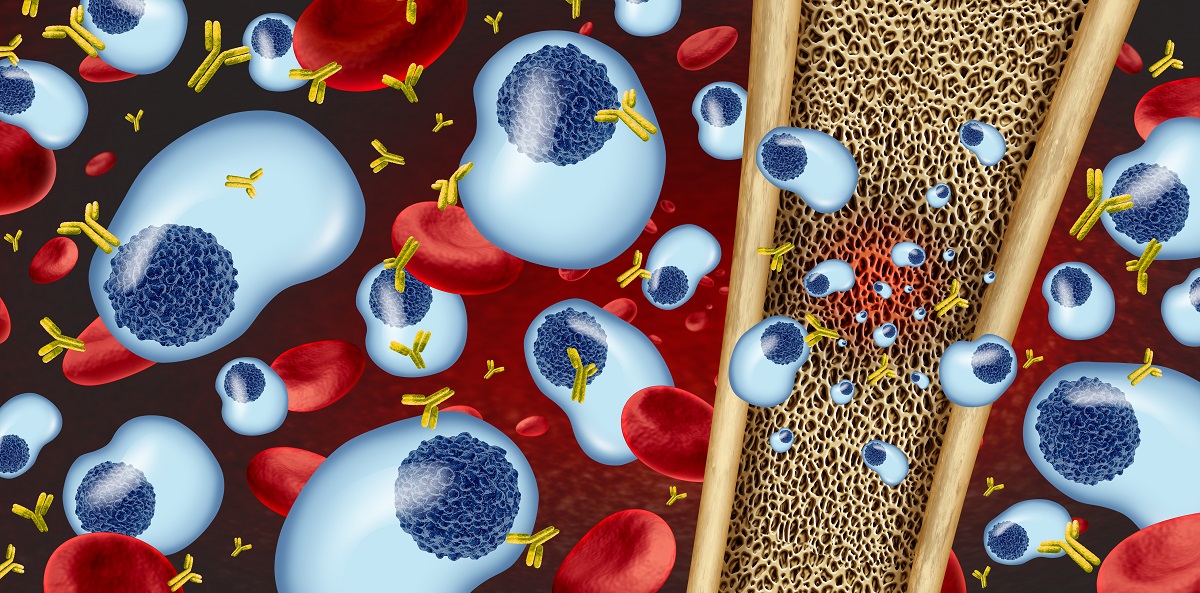KEY TAKEAWAYS
- The GMMG ReLApsE phase III trial aimed to investigate the long-term effectiveness of SCT against continuous lenalidomide/dexamethasone for relapsed MM.
- The primary endpoint was PFS, while the secondary endpoint was OS.
- The result demonstrated that despite initial promise, long-term data shows no benefit of salvage SCT over continuous therapy for relapsed MM.
GMMG ReLApsE compared a stem cell transplant (SCT) approach for relapsed multiple myeloma(MM) to continuous drug therapy. Initial analysis showed no overall survival(OS) benefit, but a sub-analysis hinted at better outcomes for those who received the transplant. So, for further investigation, researchers aimed to evaluate the long-term effectiveness of SCT against continuous lenalidomide/dexamethasone for relapsed MM.
About 282 patients were randomized, with 277 forming the intention-to-treat (ITT) population (Arm B/A n=139/138). Arm B underwent three cycles of Rd re-induction (lenalidomide 25 mg, day 1-21; dexamethasone 40 mg, day 1, 8, 15, 22; 4-week cycles), followed by HDCT (melphalan 200 mg/m2), ASCT, and R maintenance (10 mg daily until progression). Arm A received Rd until progression.
Inclusion criteria encompassed 1-3 prior treatment lines, age ≤ 75 years, time to progression ≥ 12 months for front-line HDCT/ASCT, and WHO performance status ≤ 2. R-refractory disease was excluded, and only 30/277 patients (11%) had prior exposure to R. The primary endpoint was progression-free survival (PFS). Long-term follow-up data, including OS, subsequent lines of treatment, and salvage HDCT/ASCT post-trial participation, were protocol-specified.
During the 99-month extended follow-up, 238 PFS events (86%) and 174 deaths (63%) occurred. The median PFS in the ITT population in arm B was 20.5 months, and 19.3 months in Arm A showed no significant difference (HR 0.98; 95% CI 0.76-1.27; P=0.9). The median OS was 67.1 months in Arm B vs. 62.7 months in Arm A (HR 0.89; 95% CI 0.66-1.20; P=0.44).
The lack of significant PFS and OS benefits was consistent across key disease subgroups, including R-ISS, renal function frontline single vs. tandem HDCT/ASCT, age before lines of treatment, and prior maintenance treatment post-HDCT/ASCT. Time to progression after frontline HDCT/ASCT significantly correlated with PFS in the total ITT population (p=0.001) and both trial arms independently. This was not associated with a survival benefit from Arm B vs. A (interaction test PFS P=1.0, OS P=0.7).
The multivariate analyses demonstrated significant associations of survival with age (PFS: HR 0.8, P=0.045), high-risk cytogenetic aberrations (PFS: HR 2.1, P<0.001; OS: HR 2.5, P<0.001), ISS stage III vs. I (OS: HR 2.0, P=0.02), elevated LDH (PFS: HR 1.5, P=0.04; OS: HR 2.1, P<0.001), >1 prior lines of treatment (PFS: HR 2.3, P=0.003), and no prior HDCT/ASCT (PFS: HR 1.8, P=0.04; OS: HR 2.2, P=0.009), but not with treatment arm B vs. A (PFS: HR 0.9, P=0.4; OS: HR 0.9, P=0.37).
In landmark analyses from HDCT and the contemporaneous Rd cycle 5 in Arm A (median interval from randomization to HDCT/Rd cycle 5: 117/122 days; n=103[B]/114[A]), no significant differences in PFS (23.0 vs. 20.3 months; HR 0.91; 95% CI 0.68-1.22; P=0.52) or OS (76.3 vs. 66.0 months; HR 0.8; 95% CI 0.56-1.13; P=0.2) in Arm B vs. A were observed.
After trial participation, 63% (88/139) and 70% (96/138) of patients in Arm B and Arm A, respectively, received further lines of treatment (P=0.31). However, significantly more salvage HDCT/ASCT was administered after trial participation in Arm A compared to Arm B (48/138 [35%] vs. 19/139 [14%], p<0.001). Immunomodulatory drug-based regimens (lenalidomide, pomalidomide) were used comparably after both trial arms. The rate of second primary malignancies was similar in Arm B and Arm A (26/139 [19%] vs. 19/138 [14%], P=0.3).
The result demonstrated that despite initial promise, long-term data shows no benefit of salvage stem cell transplants over continuous therapy for relapsed MM.
Source: https://ash.confex.com/ash/2023/webprogram/Paper178835.html
Clinical Trial: https://www.isrctn.com/ISRCTN16345835
https://www.clinicaltrialsregister.eu/ctr-search/search?query=+2009-013856-61.
Baertsch, M.-A., Schlenzka, J., Hielscher, T., et al. (2023). “Salvage Autologous Transplant and Lenalidomide Maintenance Versus Continuous Lenalidomide/Dexamethasone for Relapsed Multiple Myeloma: Long Term Follow up Results of the Randomized GMMG Phase III Multicenter Trial Relapse.” Presented at the ASH 2023 – 65th American Society of Hematology Annual Meeting and Exposition, December 9-12, 2023, San Diego, CA, US.



